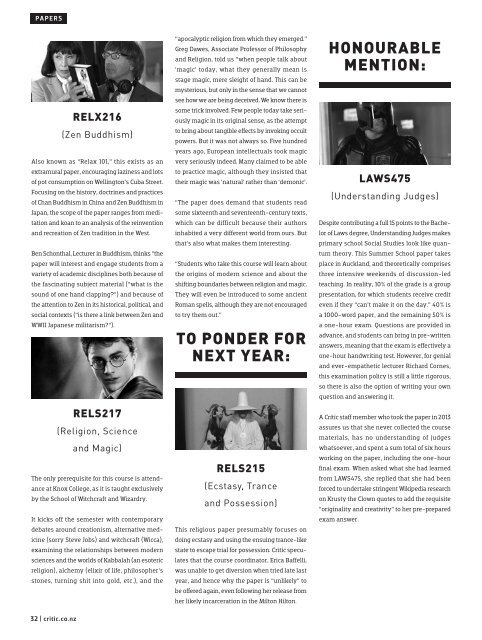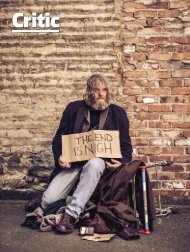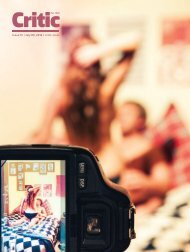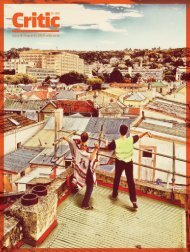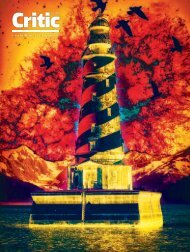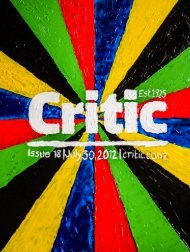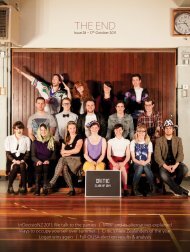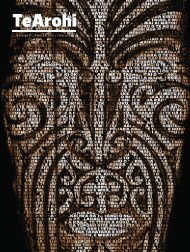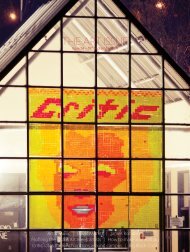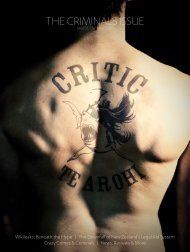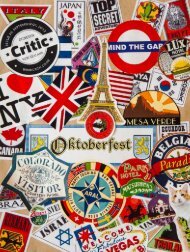Issue 01 | February 25,2013 | critic.co.nz
Issue 01 | February 25,2013 | critic.co.nz
Issue 01 | February 25,2013 | critic.co.nz
Create successful ePaper yourself
Turn your PDF publications into a flip-book with our unique Google optimized e-Paper software.
PAPERS<br />
32 | <strong>critic</strong>.<strong>co</strong>.<strong>nz</strong><br />
RELX216<br />
(Zen Buddhism)<br />
Also known as “Relax 1<strong>01</strong>,” this exists as an<br />
extramural paper, en<strong>co</strong>uraging laziness and lots<br />
of pot <strong>co</strong>nsumption on Wellington’s Cuba Street.<br />
Focusing on the history, doctrines and practices<br />
of Chan Buddhism in China and Zen Buddhism in<br />
Japan, the s<strong>co</strong>pe of the paper ranges from meditation<br />
and koan to an analysis of the reinvention<br />
and recreation of Zen tradition in the West.<br />
Ben Schonthal, Lecturer in Buddhism, thinks “the<br />
paper will interest and engage students from a<br />
variety of academic disciplines both because of<br />
the fascinating subject material (“what is the<br />
sound of one hand clapping?”) and because of<br />
the attention to Zen in its historical, political, and<br />
social <strong>co</strong>ntexts (“is there a link between Zen and<br />
WWII Japanese militarism?”).<br />
RELS217<br />
(Religion, Science<br />
and Magic)<br />
The only prerequisite for this <strong>co</strong>urse is attendance<br />
at Knox College, as it is taught exclusively<br />
by the School of Witchcraft and Wizardry.<br />
It kicks off the semester with <strong>co</strong>ntemporary<br />
debates around creationism, alternative medicine<br />
(sorry Steve Jobs) and witchcraft (Wicca),<br />
examining the relationships between modern<br />
sciences and the worlds of Kabbalah (an esoteric<br />
religion), alchemy (elixir of life, philosopher’s<br />
stones, turning shit into gold, etc.), and the<br />
“apocalyptic religion from which they emerged.”<br />
Greg Dawes, Associate Professor of Philosophy<br />
and Religion, told us “when people talk about<br />
‘magic’ today, what they generally mean is<br />
stage magic, mere sleight of hand. This can be<br />
mysterious, but only in the sense that we cannot<br />
see how we are being deceived. We know there is<br />
some trick involved. Few people today take seriously<br />
magic in its original sense, as the attempt<br />
to bring about tangible effects by invoking occult<br />
powers. But it was not always so. Five hundred<br />
years ago, European intellectuals took magic<br />
very seriously indeed. Many claimed to be able<br />
to practice magic, although they insisted that<br />
their magic was ‘natural’ rather than ‘demonic’.<br />
“The paper does demand that students read<br />
some sixteenth and seventeenth-century texts,<br />
which can be difficult because their authors<br />
inhabited a very different world from ours. But<br />
that’s also what makes them interesting.<br />
“Students who take this <strong>co</strong>urse will learn about<br />
the origins of modern science and about the<br />
shifting boundaries between religion and magic.<br />
They will even be introduced to some ancient<br />
Roman spells, although they are not en<strong>co</strong>uraged<br />
to try them out.”<br />
TO PONDER FOR<br />
NEXT YEAR:<br />
RELS215<br />
(Ecstasy, Trance<br />
and Possession)<br />
This religious paper presumably focuses on<br />
doing ecstasy and using the ensuing trance-like<br />
state to escape trial for possession. Critic speculates<br />
that the <strong>co</strong>urse <strong>co</strong>ordinator, Erica Baffelli,<br />
was unable to get diversion when tried late last<br />
year, and hence why the paper is “unlikely” to<br />
be offered again, even following her release from<br />
her likely incarceration in the Milton Hilton.<br />
HONOURABLE<br />
MENTION:<br />
LAWS475<br />
(Understanding Judges)<br />
Despite <strong>co</strong>ntributing a full 15 points to the Bachelor<br />
of Laws degree, Understanding Judges makes<br />
primary school Social Studies look like quantum<br />
theory. This Summer School paper takes<br />
place in Auckland, and theoretically <strong>co</strong>mprises<br />
three intensive weekends of discussion-led<br />
teaching. In reality, 10% of the grade is a group<br />
presentation, for which students receive credit<br />
even if they “can’t make it on the day.” 40% is<br />
a 1000-word paper, and the remaining 50% is<br />
a one-hour exam. Questions are provided in<br />
advance, and students can bring in pre-written<br />
answers, meaning that the exam is effectively a<br />
one-hour handwriting test. However, for genial<br />
and ever-empathetic lecturer Richard Cornes,<br />
this examination policy is still a little rigorous,<br />
so there is also the option of writing your own<br />
question and answering it.<br />
A Critic staff member who took the paper in 2<strong>01</strong>3<br />
assures us that she never <strong>co</strong>llected the <strong>co</strong>urse<br />
materials, has no understanding of judges<br />
whatsoever, and spent a sum total of six hours<br />
working on the paper, including the one-hour<br />
final exam. When asked what she had learned<br />
from LAWS475, she replied that she had been<br />
forced to undertake stringent Wikipedia research<br />
on Krusty the Clown quotes to add the requisite<br />
“originality and creativity” to her pre-prepared<br />
exam answer.


